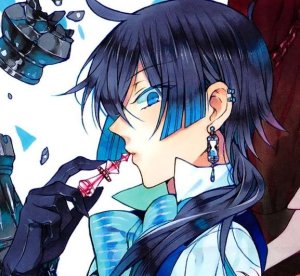
This review may contain spoilers
I was extremely disappointed in this movie. Ai Yazawa is one of my favorite mangakas and her work has revolutionized shoujo manga as a whole, she focuses on characters and gives them a multi-dimensional take that creates complex relationships and realistic problematics. This movie took all of that away. They made a bland romantic comedy out of a complex and interesting story. By changing the ending, they let her settle with the person that Yazawa spent 5 volumes explaining in detail why she wasn't supposed to end with. They were bad for each other, very bad, and no matter how much they tried, they just were not good as a couple. This was never meant to be a cutesy romantic comedy, that's not what Yazawa writes, this was meant to be a manga about extremely different people with very complex walks of life coming to age and facing what lies ahead of high school. Yes, there is romance, but not in a fairy-tale happy-ending kind of way. Not to mention the aesthetic is way off and I saw more fashion in Runway Beat than I saw in this movie (I've seen cosplayers doing better renditions of that blue dress). I also believe the casting choices were very weird, casting an actor with the range of Yususke Yamamoto for a character that is extremely low-key and Osamu Mukai for a character that should be excessively over the top, I don’t know how that happened. I can only appreciate Shunji's performance as Isabella, who is my favorite character in the manga, and who should have had more time to develop herself as a transgender woman facing an unaccepting world, but Shunji did the best he could under the circumstances. I can understand that people who have never read Ai Yazawa could have enjoyed this, but I sincerely can’t look past what they did with a story that was so well written. Especially, after the NANA movies were so well-done, I was really expecting more. If you have read the manga and liked it, I recommend you watch this movie with a punching bag beside you. If you haven’t read the manga and loved this movie, the manga is probably not for you. Was this review helpful to you?

Was this review helpful to you?

However, when you continue watching content and you find yourself comparing most media you come across to this one, you start to think you have to put out there how good it is. It deserves at least that time of my day. And, also, I think Xiao Zhan right now needs all the praise he can get, because he also deserves it.
Even having seen other versions, I still fell in love with this story all over again with the drama. I feel like each adaptation of this work has its own identity, in a way, that derives of several things, like what the medium itself can offer, who portrays the characters, what the adaptation is allowed to showcase due to censorship, etc.
The drama version is, possibly, the furthest from the source material in various instances, but I feel that only adds to the fun of hearing the story all over again. Because this is, I assure you, a story worth hearing several times, not only because it’s very good but also because there are a lot of characters, time frames, mysteries and elements at play, all handled beautifully in the drama.
You can’t make a version of Mo Dao Zu Shi without two good leads that have chemistry. In the case of the drama, it was even more important, because some of the things other adaptations can show, in different degrees of explicitness, the drama cannot. So it falls on the directing and on the acting to convey the relationship that is the foundation of the story, with whichever elements they’ve got. And Xiao Zhan and Wang Yibo are just perfect in the roles. They understand the characters, the relationship and the story, and it shows.
The entire cast is like hand-picked to perfection. Even if some characters have variations with other versions in terms of characterization, they all do such a great ensemble job that it’s hard to imagine anyone else in the roles they’ve got. Marius Wang deserves all my praise, because Jiang Cheng is such a complex character to portray, and he does it amazingly, his emotional scenes annihilated me.
This drama is a different version of the source material yet it has in it the essence and foundation of it and works with amazing scenery, incredible production design and the music, which is such an important part of MDZS in every version, is sublime.
If you’ve never watched a xianxia series before, don’t fret, I think this drama is a good first dive to it, especially because there’s so much more material to get into if there’s something you can’t quite grasp.
If you’re looking for lgbtq+ content, this particular version might be the less explicit but it’s incredibly emotional and has the positive vibe the subject matter deserves while having the relationship involved in a fantastic plot, with political turmoil, assassinations, mystery, action, amazing female characters (with more to do than in other versions of the story, congrats CQL for doing that) and an amazing cast.
Just watch it, basically, is what I’m saying. If historical fantasy and good lgbtq+ content is in your radar, give this a go.
Was this review helpful to you?

The movie is basically drenched in KERA magazine, so you'll see a lot of familiar faces and brands if you're a reader: AKIRA, Karam (from The Boss) and Misako Aoki, for example, and everyone's dressed as if we were entering an alternate reality where KERA fashion was the norm (I wouldn't be mad about that, honestly, but yeah, you're gonna have to suspend your disbelief with that one). Product placement in this movie is very heavy, even more so than in Runway Beat, so half of the movie is a giant KERA fashion spread. I'll make a little note before moving on, I'll refer to the actress AKIRA with all caps to differentiate her from the character Akira from the movie.
The story is based on a Mayu Shinjo manga of the same name, and I'm not a big fan of hers to be honest, I feel her stories are all very similar, her characters look the same, her plots are simple and rely on a consistent wish-fulfillment trope and sex rather than world building, character development and/or original content. So yeah, not a fan. This particular one was always one I stayed away from because I feel it uses gender as a tool for fanservice more than to explore it as a subject in itself: there's a guy who is very feminine looking and a girl who is very masculine looking, they fall in love and Mayu Shinjo level of flirting and spices ensue. Add to that two rival schools (an all-girls one and an all-boys one) and an all-girls rock band (in the movie Akira isn't in the band) and you have your plot. At the end of the day, they're a cis het guy and a cis het girl and their gender presentation never seemed to me to be necessarily a subject of bigger debate. If a mangaka like Ai Yazawa was doing this, for example, we would have another kind of narrative. But, I digress.
The movie is tamer than a Mayu Shinjo manga, but the issues of gender and sexual orientation are as plain as they can be. There’s girls attracted to girls and boys attracted to boys but, at the end of the day, it’s all seen as a game rather than an aspect of sexual attraction or gender identity. Akira, Karam’s character, insists on having Mizuki, Ito Ono’s character, girly clothing because he thinks she wants to look girly deep down because "all girls do" and "she's beautiful". Akira makes a point to shame his classmates for liking him because men liking men "is a no-go". It’s the same old story where these narratives are used for fanservice rather than actual representation. But it had the potential to go much further.
The thing is, the cast has some members whose careers and lives are marked by these things. AKIRA made a career of her boyish look and style and is one of KERA’s most successful models right now, and has been for a few years, so gender fluidity is a brand for her. Still, she admits in interviews to being concerned about her presentation and what’s expected of her in society. Most importantly than anyone else in this cast is Shuto Yoshihara, a trans man member of the all FtM trans boy band SECRET GUYZ, who was cast as a girl. These two people right here could have been the leads with ease. Their performances steal the show and it would have been a much more valuable narrative if AKIRA, a masculine female model whose career is based on gender fluidity (she plays male roles in theater for heaven’s sakes) played masculine-looking Mizuki and Shuto Yoshihara, whose career speaks about making his experience known as a trans male, played an actual male role, Akira. But no, we get Karam, who is trying but doesn’t quite make it, and Ito, who isn’t even trying at all. I'm not aware when exactly Shuto transitioned, but since his debut with SECRET GUYZ was in 2013, this could have been a major platform to start up with as a starring role.
All in all, the movie isn’t bad but it isn’t great. It shows that it’s a niche film made for the sub culture market in which it’s inscribed in but has a story that could have gone further if only it had allowed itself to get out there all the way. It has good moments and its intention is good, it definitely puts out there subjects of gender presentation vs identity and bonds between people despite preconceptions of gender, but it had the potential to go much further, and the performers to do so as well. I thank it, however, for including and casting people outside the norm and giving a platform in which this can expand.
Was this review helpful to you?

For what it is, I guess it's entertaining, they make fun of tropes and say some things a lot of us are thinking when watching dramas in general (my favorite quote being the male lead admitting to being a jerk) and they do twist things up a bit, which is rather interesting to some extent. It's short and ends with cliffhangers so you could end up watching it all in one sitting and be fairly entertained. I don't think they're aiming for it to be realistically depicted, since it's all more or less in an ironic tone, exaggerated acting and weird choices aren't too much out of place. It's not the best performed drama out there, not at all, but it's not taking itself seriously either, so it doesn't really bother that much that it isn't. For the most part, because Justin Chon can be too much for me sometimes in everything I've seen him in.
My main issue with the drama is linked to something I've noticed in the last 7 to 10 years in the kpop world and not so much (or almost at all) in the jpop world. When kpop became more exportable to English-speaking cultures, especially in USA, people who came into the world of Asian music and dramas then started sort of expecting it to be catered to them rather than seeing it as something made for other audiences, a foreign product of which they were guests to, something I believe jpop fans were always used to. For example, I started seeing kpop Youtubers criticize kpop bands for not using English grammar correctly in their videos, or seeing kpop fans question why the bands they liked had to "bother to go to Japanese shows and sing in Japanese at all" and things like that. Instead of adapting to these products, the new crowds started expecting the products to be adapted to them and their western views, and I found it particularly curious how kpop, contrary to jpop, started attempting to cater back to them.
Taking that into account (especially when I compare this to Lost In Austen, which was my first thought upon seeing it) I feel that this drama is more the North American view of what kdramas are rather than a kdrama in itself. This is taking what an American white girl idealizes from kdramas, as in tropes, cliches and plot devices, and romanticizing that in a fictional world where culture isn't even mentioned. When cultural stuff appears, it's rather as a "drama genre" or a "trope" rather than an actual cultural representation, separating this "DramaWorld" from South Korea as a whole. This makes me uneasy, because it reduces things that are a product of South Korean society and culture as "just kdrama things" under the view of the American white people who were in charge of creating this and, by extension, of the protagonist, who rather than trying to subvert the cliches or question the narrative, idealizes what is problematic of kdramas and overlooks what is culturally specific.
I understand this drama isn't meant to be serious, that it's meant to be a parody, but to me it represents the western view of South Korean media, pushing aside what it really is trying to be. If this had been about this white girl learning things from this culture and also influencing the female protagonist of the drama with some of her western ideas, to create a change of perspective for both (I hate to say this, I really do, but kind of what Teen Beach 2 was about) or if it had been about a South Korean girl getting into the world of dramas and questioning what she considers her idealizations and aspirations of her own culture, then it would have been much more interesting to me. Even as a parody.
Was this review helpful to you?

The cozy cooking genre (is it a genre?) is one of my favorite things ever and when it's paired with wonderful stories and characters, all the better. I haven't read the comic this is based on but this drama does what it needs to spark my interest.
Higa Manami (stellar performance, as usual) is Nomoto Yuki, a woman living alone who enjoys cooking but doesn't have people around her to share her cooking with as much as she'd like. She is burdened by the social expectations of what being a woman her age means to those around her and what enjoying cooking as a hobby and not a profession seems to imply to them: that she could be a good wife or a good mother. Nomoto san wants to cook because she likes it, for someone who appreciates it, away from the burdens of social expectations.
Nishino Emi (I just met her but I love her) is Kasuga Totoko, a woman living alone in the same apartment building as Nomoto san, who loves to eat. She eats with relish and with respect and awareness of the food she has, enjoying it with presence. She has lived a life in which she is expected and demanded to eat less, because she's a girl and should have smaller portions, consider her figure, and other nonsense that Kasuga san doesn't care about.
Like the red thread of fate, these two meet and magic happens. They connect, not only through food but through each other and it will be a meeting that will set in motion re-thinking what they think they know about themselves.
A wholesome, cozy, food-filled queer jdrama to add to the list of its predecessors and that I hope continues because we need more of these.
Was this review helpful to you?
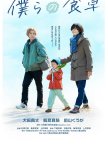
I read this manga a while ago and re-read it when I found out it was being adapted because it's such a cute, heartfelt, sweet short manga and the adaptation is successful in representing all of that. Both tell the story of a reserved and taciturn young man who meets a little boy and his scary looking older brother, a meeting that will prompt them to connect and learn what it means to develop a found family.
The adaptation of the story isn't exactly beat by beat, the drama expands on some things the manga doesn't get involved in and changes some things from their manga order, but does so in a way in which it feels organic for the new format and doesn't take away from the story.
The biggest change from source material to live action, I think, is the perspective in with Yutaka's family is seen. The manga doesn't have much of an intention for Yutaka to mend any bridges with his family and instead focuses on his newfound one with Minoru, but the live action changed that view and goes into Yutaka's family more in order to have a different take on that relationship. That is more of a choice of what kind of story you want to tell, I don't think either is better, it's just a matter of narrative intent for each one.
I have to commend them on finding a little kid who could be as adorable as Tane is in the manga, which seems impossible but they did it.
Another solid entry in the cooking adaptations and totally recommended for those who seek some cozy warm feelings and the story of people finding where they belong.
Was this review helpful to you?
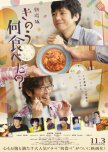
I have mixed feelings towards the movie, in comparison to the show.
I DID enjoy it, don't get me wrong, it's a good movie, the acting is great, and it carries on with the spirit of the show and the essence of what made it great: the cozy-ness, the amazing cooking, the genuine portrayal of a relationship of two men in their 40s in a country that doesn't recognize their partnership legally, the navigating said relationship with family, workplace and society as a whole.
The movie does add a bit more on the personal feelings of both characters, with a situation that generates a parallel for both in different points of the movie.
And when I say "a bit" I mean...a tiny bit. I am disappointed in the fact that I don't think they took it far enough for a movie.
It felt like a long episode of the show and, to be honest, when you have the opportunity of a movie, I think your storytelling possibilities expand in other directions that I don't feel they took. Ossan's Love, for example, isn't as good as this show when it comes to taking things seriously (and the acting isn't as good as this, in general), but they did use their movie to give a step forward that allowed them to pull off a better season 2.
I feel like they didn't go as far as they could have with the movie, in terms of using the vehicle to give a much deeper glimpse into one of their conflicts, picking just one to explore and going all for it. The movie has a sort of array of situations that get developed somewhat, rather than one that can get fully expanded.
I say this also because, since watching season one, I was able to read some of the manga and I feel like the manga gets more intimate with Kenji's and Shiro's relationship in some levels that we don't get in live action form. And, when I say "intimate", I mean communication wise, not necessarily just physically. I feel like there's a lot of deep emotional exploration that gets somewhat cut short by the fact that they move on to the next issue before delving deeper into the prior one, and the movie format could have allowed them to have the space that a series format may not allow for them to do just that.
All in all, it's a lovely movie and I'm happy to see more of this show coming out. I have high hopes for the second season that I've already started. I just wish the movie could have given a step forward in development, but I don't think this was quite that.
Was this review helpful to you?
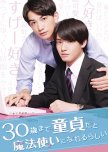
30-sai made Dotei Da to Mahotsukai ni Nareru rashii
0 people found this review helpful
More than meets the eye
I had 0 expectations with this one. The title isn't really helping and the premise is a bit...strange. However, I was, for the most part, pleasantly surprised.I don't know the manga this was based on, but this adaptation really smoothed a lot of edges of what "regular BL content" is mostly like. They took a story that could have been yet another one of those, and gave it a lot of heart, polishing some (not all) of the problematic aspects of storylines that play in the edge between representation and fanservice.
The main relationship is devoid of a lot of the toxic tropes you normally get, not only in BL content, but in romantic dramas in general. The premise of the lead being able to read thoughts makes it so that the situation could have gone into a serious dub-con territory and it never did. The relationship progresses in a natural, interesting way and the mind-reading assists in telling the story, rather than provoke unnecessary complications.
The absolute gem for me in this one was the first ever canon aroace character I've seen in a jdrama. I've found ace and aroace characters in manga before (few and far between) but this is the first time that, not only I see one in a jdrama, they are also confirmed by the writing team. I won't spoil which character this is, so I'll remain ambiguous with my description, but it's not one of the two mains, it's a side-character. Not only are they iconic, they're also depicted as loving, caring and a fantastic friend, and that's the kind of aroace representation I want.
My only issue with the drama was the side couple. It made me kinda uncomfortable, I'm not gonna lie. Minato (Goto Yutaro) looked incredibly young and Masato (Asaka Kodai) looked even older than he is. I'm glad Minato wasn't supposed to be a teen, and that at least the actor was older than he seemed, but I couldn't help feeling pretty uncomfortable with their development, especially since they had more physical scenes than the lead couple, albeit nothing major.
All in all, I wanted to leave a review because 1) I was super close to not watching this at all, based on the marketing and title and 2) it has an aroace character and pretty good handle of relationships, for the most part. I'm glad I gave it a chance.
Was this review helpful to you?
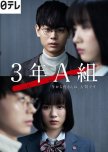
3 Nen A Gumi: Ima kara Mina-san wa, Hitojichi Desu
0 people found this review helpful
Since this is a thriller-suspense in part, every episode has its plot twists and reveals, so I’m going to keep it as spoiler-free as possible, but even though I’ll remain vague to specifics, know that there’s little you can do spoiler-wise with this one if you want to have a fully-fleshed review.
I like to refer to this drama jokingly as “Gokusen with explosions”. Still, it actually blends three genres of drama, which don’t tend to mix well, and does so very seamlessly: high school drama, thriller and tokusatsu.
The entire plot is set on the thriller, it has a really good grasp of its narrative and it really immerses you in from episode one. Some reveals aren’t too unexpected, but that doesn’t really ruin the watching experience, since they’re thought through and well-written, for the most part.
The high school drama is a genre that I don’t tend to gravitate much towards unless there’s some catch, and this one has that. The development of the students and their issues is more into the realms of something like 12 Suicidal Children (albeit here it’s better written) than something like Dragon Zakura or Gokusen. Not every issue is developed as much as it could, but this drama takes its issues more seriously and with much more intensity than your typical high school drama would.
The tokusatsu aspect is used here as a sort of allegorical parallel that works super well. You end up finding out how it works and why it’s there as you go along with the plot, and to me it was a really fantastic addition. I am a sucker for well used archetypes and this drama really knew what it was doing.
Related to that, there are few actors that could have taken the lead as well as Suda Masaki did. I was initially reticent because I would have thought his character older, but he has the right experience in all the genres this drama is made out of (thriller? check, high school dramas with a twist? check, tokusatsu? double check) and it absolutely shows in his performance.
I have smaller nitpicks here and there with how some of the characters were handled and how some tropes were used but my biggest qualm with the drama is, like I said, that it sadly aged immensely in the past year since it’s been out.
Here I'll be delving into some mild spoilers, I wont specify how this comes into play but a subject matter present in the drama will be discussed.
One of the many things portrayed in this drama is related to cyber-bullying, social media and suicide. In the last months we’ve had more than one case of this happening in the Japanese media industry. More than one. Not an isolated event, this is a huge problem.
The drama uses that to bring across a discourse of responsibility and taking accountability for your actions, which is really good, and it does a good job using the theme of empathy and change. It does base its premise in maturing and learning while putting ourselves in the other person’s shoes. It has a good aim and a realistic approach in which solutions could be found in small personal changes.
However.
There is something that is mentioned, used and described in the drama that gets zero attention when it should be paramount in this sort of premise: mental health.
The drama uses mental illness in different important ways for the plot, and even though it showcases it and sets it as something important, it does not develop the lack of proper care of it and the lack of conversation about it as one of the key parts of society’s failure towards the subject matter discussed.
I know that in jdramas that doesn’t tend to be expected and that I have to put myself in the place of the social environment these dramas come from, but some things are not culturally specific, some things are universal, and mental health care should be.
Maybe last year, when the world was in a different place, it was easier for the regular audience to dismiss it and move along and just stay with the sometimes really shallow rant of “people+social media=bad”. Sadly, we should know better now, and this drama has aged faster than anyone expected.
If the drama had not mentioned it, had not even included it, I would have thought it an overlooked element but not been as disappointed, but it is a very important part of its plot for more than one character, and I can’t help thinking that it reflects the missing conversations that society should be having on the subject of mental health care and the neglect, shame and overall silence these themes are seen by in regular media.
The lack of proper attention to these subject matters and the absolute lack of accessibility to proper mental health care, not only out of money and means but out of a social stigma that prevents people from reaching out to professional help when needed, is a key element of this storyline and it is sadly not there.
As of September of 2020, in the Japanese industry, it has become more glaringly obvious than ever.
Overall, the drama is very very good and I recommend it highly for those seeking a good thriller and a very emotional and deep type of drama about learning and growing up. It’s sad that the subject matter is so painfully relevant that reality has surpassed its premise with heartbreaking impact.
Was this review helpful to you?

Kimura Fumino does a great performance as Kanbara Kiko, the out-of-place mother who's absolutely out of her depth in a school where other mothers are not only in completely different social spheres than she is (with the exception of her school friend Yuki, played by Kanjiya Shihori), they have very different values which she comes into conflict with constantly. As it's expected from this kind of drama, this will lead to her being the "breath of fresh air" in this environment, providing a real perspective and contrast to these women, and will be in the center of gossip, drama and a fair share of misunderstandings. Not unheard of in jdramas, not at all.
What I appreciated, though, was that every episode had a moment for Kiko to speak her mind. She wasn't a character to hold back when her values were threatened or when she saw someone in trouble, she didn't hold back when it came to defending children from their mothers, mothers from their husbands or standing up for her son at every moment it had to be done. The drama could have made her a victim, could have had her suffering for 9 episodes and a half, but it didn't, and I'm so very grateful for that.
The relationships that sprout between these ladies are a delight to watch. They all have different perspectives and even the ones that start being terrible have reasons behind them and no one is left unexplored. There are toxic marriages, there is depiction of domestic abuse, relatives with mental illness, harassment, neglect...and a lot of ladies learning and standing up for each other. At the end of the day, that's what I'm really here for, all jokes aside.
If you're into strong female characters, unapologetic leads and interesting stories of women above the age of 30, this is a good one to watch.
Was this review helpful to you?

Even though this review is late and won't probably add much to the already present lineup of recommendations, if there's one drama I will go back to for seconds (pun intended) is this one.
After a bit of a letdown with the movie (I reviewed it as well), this story came back to its drama format, which I think is the best vehicle for it. The episodic nature allows the vibe of it to be as it is, without it dragging and without plot points going around in circles.
This season finds Kenji and Shiro with a common thread of looking for permanence (at work, at home, with friends, with family, especially with each other), which was hinted in the movie but gets well developed here. I do think the movie is a necessary viewing between the two seasons (and special), a bit of a stepping stone into the themes of this season, even though the narrative of it isn't as tight as in this season.
Conversations about middle age problems, about how to find a permanent family with someone you can't legally name as such, about parents and their perceptions of their sons' lives, plus the side characters we know and love coming back, makes this one a great season and a very well written step forward for these two.
The acting is always *chef's kiss*, but this season really goes to emotional territories that allow Shiro to show more vulnerability and Kenji becoming more mature. All of this, of course, with amazing food, as always.
This adaptation came back to where it shines best and I hope this isn't the last we see of them!
Was this review helpful to you?

Rinsho Hanzai Gakusha Himura Hideo no Suiri
0 people found this review helpful
It is said that, in storytelling, whether or not a subject has been told is irrelevant, where true originality needs to lie is on how it's told. And I think this drama has something that makes it really worth the watch, despite the countless detective dramas you'll see around: the two leads.
Leading detective duos are not uncommon, especially not on dramas, but there has to be a very precise balance to work them out: it isn't just about having good characters and good actors, it's also about the actors having good chemistry and working well together. In this one, that's the heart of the drama. I was a bit weary when I started watching because even though Kubota Masataka is a very good actor, some of his pairings tend to not work as well as expected. But that's where Saito Takumi comes in, he works really great in duos and adapts very well to different people. The relationship between Himura and Arisu is the key of this drama, it's an anchor for the characters as well as what makes them move forward, and these two deliver that amazingly well.
The story isn't at its full potential, probably because this is adapting books that have much more space to deliver mysteries and create intrigue. When it comes to cases, it may not be the most innovative drama out there, and for the restraint of adapting to this medium, it may feel somewhat rushed in some places. Still, the characters are all very interesting and these two leads shine both individually and as a duo. They have a sort of Sherlock/Watson resemblance, in the sense that Himura is the smart, calculating and seemingly cold detective while Arisu is the emphatic, loyal and light-hearted companion, but they both shine in their own right and Arisu isn't in any way less smart, interesting or action-prone, as well as Himura has a very emotional side which is the core of his character arc and where him and Arisu connect. It was this core what made me more interested in Himura as the series went on, because Arisu was easily the most fun to watch at first, but Himura's constant turmoil between good and evil and his fear of hurting others hits very deeply with Saito Takumi's performance.
All in all, it has its flaws, it's not a perfect detective drama, but I haven't seen such great chemistry in a drama in a while, and I'm glad these two weren't shy to go to these extents to show it. If you're more interested in well-written mysteries with very surprising twists, maybe this one isn't for you, but if you're more interested in characters, their development and amazing on screen chemistry between these two great actors, then give this one a shot.
Was this review helpful to you?

